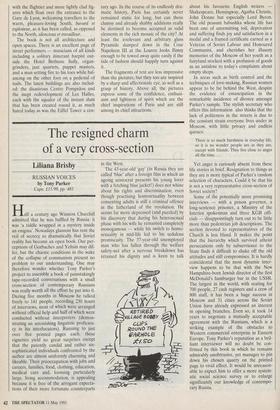The resigned charm of a very cross-section
Liliana Brisby
RUSSIAN VOICES by Tony Parker
Cape, f15.99, pp. 481
Half a century ago Winston Churchill admitted that he was baffled by Russia: it was 'a riddle wrapped in a mystery inside an enigma'. Nowadays glasnost has rent the veil of secrecy so dramatically that Soviet reality has become an open book. Our per- ceptions of Gorbachev and Yeltsin may dif- fer, but the chaotic conditions in the wake of the collapse of communism present no problem to our understanding. One may therefore wonder whether Tony Parker's project to assemble a book of painstakingly tape-recorded conversations with a small cross-section of contemporary Russians was really worth all the effort he put into it. During five months in Moscow he talked freely to 141 people, recording 230 hours of interviews, most of which were arranged without official help and half of which were conducted without interpreters (demon- strating an astonishing linguistic proficien- cy in his interlocutors). Running to just over five printed pages each, these vignettes yield no great surprises except that the patently candid and rather un- sophisticated individuals confronted by the author are almost uniformly charming and likeable. Their preoccupation with jobs and careers, families, food, clothing, education, medical care and, looming particularly large, living accommodation, is appealing because it is free of the arrogant expecta- tions of their more fortunate counterparts
in the West.
The 43-year-old 'gay' (in Russia they are called 'blue' after a foreign film in which an ageing aristocrat presents his young lover with a fetching blue jacket!) does not whine about his rights and discrimination, even though practising homosexuality between consenting adults is still a criminal offence in the fatherland of the revolution. He seems far more depressed (and puzzled) by his discovery that during his heterosexual phase with his wife he remained completely monogamous — while his switch to homo- sexuality in mid-life led to his sedulous promiscuity. The 37-year-old unemployed man who has fallen through the welfare safety-net after a nervous breakdown has retained his dignity and is keen to talk about his favourite English writers Shakespeare, Hemingway, Agatha Christie, John Donne but especially Lord Byron. The old peasant babushka whose life has been one of unremitting toil, deprivation and suffering finds joy and satisfaction in a medal and a framed certificate earned as a Veteran of Soviet Labour and Honoured Communist, and cherishes her illusory memories of the Moscow of her youth as a fairyland stocked with a profusion of goods as an antidote to today's complaints about empty shops.
In areas such as birth control and the techniques of love-making, Russian women appear to be far behind the West, despite the evidence of emancipation in the remarkable incidence of divorce amongst Parker's sample. The stylish secretary who offers this information also thinks that the lack of politeness in the streets is due to the constant strain everyone lives under in Moscow, with little privacy and endless queues:
There is so much harshness in everyday life, so it is no wonder people are as they are, except with friends. They live close to anger all the time...
Yet anger is curiously absent from these life stories in brief. Resignation to things as they are is more typical of Parker's random selection of characters. Could it be that his is not a very representative cross-section of Soviet society?
Some of the potentially more promising interviews — with a prison governor, a long-sentence prisoner, a Ministry of the Interior spokesman and three KGB offi- cials — disappointingly turn out to be little more than pedestrian job descriptions. The section devoted to representatives of the Church is less bland. It makes the point that the hierarchy which survived atheist persecutions only by subservience to the State finds it difficult to shake off the old attitudes and still compromises. It is hardly coincidental that the most dynamic inter- view happens to be that with the New Hampshire-born Jewish director of the first McDonald's hamburger bar in the USSR. The largest in the world, with seating for 700 people, 27 cash registers and a crew of 800 staff, it has been a huge success in Moscow and 31 cities across the Soviet Union have already expressed an interest in opening branches. Even so, it took 14 years to negotiate a mutually acceptable agreement with the Russians, which is a striking example of the obstacles to Western commercial enterprise in Eastern Europe. Tony Parker's reputation as a bril- liant interviewer will no doubt be con- firmed by this book in which he remains admirably unobtrusive, yet manages to pin down his chosen quarry on the printed page to vivid effect. It would be unreason- able to expect him to offer a more system- atic social science survey or to enlarge significantly our knowledge of contempo- rary Russia.


























































 Previous page
Previous page